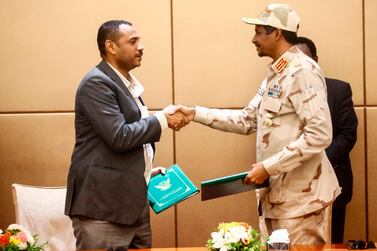The UAE and Saudi Arabia announced on Wednesday that they would send a combined aid package of 540,000 tonnes of wheat to Sudan.
The donation will cover basic food needs for three months as part of efforts to support the Sudanese public and ease its crisis, the state news agency Wam reported.
More than 280,000 tonnes of wheat have already been shipped to Sudan.
Both countries are keen to provide "all possible support to Sudan in overcoming its difficult conditions and achieving economic stability and food security," said Mohammed Al Suwaidi, director general of the Abu Dhabi Fund for Development.
The shipment is in line with a previous pledge of billions of dollars from the two Gulf States after the removal of Sudanese president Omar Al Bashir in April following months of protests.
Last month, Saudi Arabia deposited US$250 million (Dh918m) in the Central Bank of Sudan to support its financial position, the Saudi Finance Ministry said.
The grant is part of a package with the UAE worth $500m.
Both countries pledged an overall $3 billion in aid, with the rest going towards fuel, wheat and medicine.
The grant is aimed at easing pressure on the Sudanese pound and achieving stability in its exchange rate, the ministry said.
Because Sudan is still listed by the US as a state sponsor of terrorism and is in arrear by $1.3bn to the International Monetary Fund, it is unable to tap into the international body or the World Bank for support.
Sudanese banks have struggled to re-establish correspondent relationships with foreign banks.
In December, mass protests began against Mr Al Bashir because of the declining value of the currency and shortages of basic goods.
The Sudanese army toppled Mr Al Bashir in April. The former president was then arrested.
While the ruling military council is negotiating with protest leaders about a transition to civilian rule, countries including the US are urging the two sides to come to an agreement quickly.
They say the new administration urgently needs to address many of the underlying issues that sparked the original protests.
A constitutional document was signed on Sunday between Sudan’s military council and representatives of the opposition coalition to pave the way for a transitional government.
It is designed to end a cycle of military dictatorships and dysfunctional civilian governments that have defined the country in its 63 years since independence.







